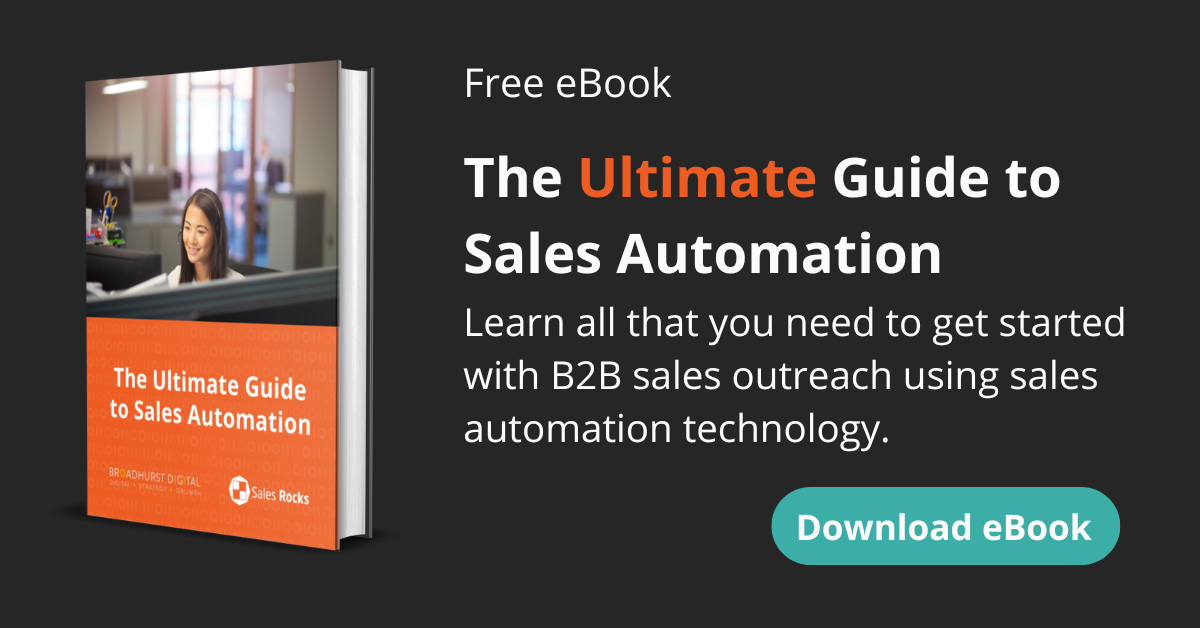Sales technology is essential for any B2B business that wants to improve their sales process. B2B buyers have more information at their fingertips, reaching a decision maker is increasingly challenging for sales reps. This is why investment in effective sales technology can help you close more deals and achieve your business goals.
In this blog post, we'll be going over the basics of sales technology, from CRM to email tracking to document and contract management. We hope this guide will be helpful for beginners and as a refresher for those who are already familiar with sales technology. Stay tuned for more blog posts on sales technology in the future!
What is sales technology?
Sales technology has become an essential part of scaling a business's sales function. It can help sales people manage their leads, improve communication with customers, and track their sales activity. By using this technology correctly, you can increase your chances of making more sales and achieving your business goals. Not sure what sales technology is? Here is a quick guide to help you understand what it includes and how it can help you achieve your sales goals:
CRM - Customer Relationship Management
CRM is a sales technology that helps manage customer data and relationships. A well-configured CRM system can save time and money for your business, making it an essential investment.

As far as sales technology goes, having a great CRM is a must-have investment for any modern sales leader. Without a CRM, much of the benefits of other sales technologies will never be realised as they rely on having good customer and prospect data, which is provided from your CRM.
There are many different CRM software vendors to choose from. In fact, at the time of writing (July 2022) there are 354 CRM solutions listed on Martechmap.com, a website that monitors sales and marketing SAAS products.
When choosing CRM software, you should consider the following factors:
1. Features: The features of CRM software vary, but most businesses need at least a customer relationship management (CRM) system, a contact management system, a customer intelligence system, and a sales force management system.
2. Cost: CRM software can range in price from free to several thousand dollars per month.
3. Ease of use: CRM software should be easy to use and navigate.
4. Scalability: CRM software should be able to grow with your business.
5. Integration: CRM software should be able to integrate with other business software applications.
6. Customer support: The customer support offered by CRM software should be reliable and helpful.
7. Training: CRM software should come with training that will help you
We recommend HubSpot CRM due to its comprehensive integrations and ease-of-use for businesses of all sizes. Book a HubSpot CRM demo with us to learn more.
Sales automation
Sales automation software can help to streamline your sales process and make it more efficient. It can also help to automate tasks, like capturing leads and tracking customer data.
Sales automation technology is providing significant benefits for businesses across a wide range of industries. By automating repetitive and time-consuming tasks, businesses are able to free up valuable resources that can be better spent on other activities.
One of the most important benefits of sales automation is its ability to help companies scale their cold email outreach and sales prospecting. By automating these processes, businesses can reach a larger number of potential customers with relative ease. In addition, sales automation can help to create more personalised and targeted messages, further increasing the chances of successful sales prospecting.
Despite the clear benefits of sales automation, some businesses have been hesitant to embrace this technology. However, with the competitive landscape being what it is, companies can no longer afford to be left behind. Automating sales processes is essential for scaling businesses that want to stay ahead of the curve and continue to grow.
Sales automation is particularly effective for businesses with a long and complex sales cycle. By automating key tasks and reducing admin associated with managing a deal through the sales funnel, sales reps can improve their efficiency and close more deals in a shorter period of time.
Investment into sales automation is at an all time high, with 515 products in the Sales Automation Enablement & Intelligence space according to Martechmap.com.
Our top recommendation for sales automation software is Sales Rocks. This Netherlands-based software has outstanding customer support and excellent automation capabilities. Book a Sales Rocks demo to learn more.
Document and contract management
B2B sales are a time-sensitive process, and proper document and contract management can make a big difference. Having a system in place can help companies avoid potential legal issues, and ensure that all relevant information is easily accessible. A good document management system will help keep track of important information such as contracts, amendments, and signatures.
Document and contract management software simplifies the process of creating, storing, managing, and sharing complex business contracts. It allows users to easily collaborate on documents, track changes, and see the status of a contract at any time. This helps businesses save time and money by avoiding the need to print and ship paper documents back and forth.
Another benefit of contract management software is that it helps businesses stay compliant with regulations. By keeping all contracts in a central repository, businesses can be sure that they are always up-to-date on the latest changes. This can help avoid costly fines or penalties for non-compliance.
HubSpot CRM comes with a document management tool that is available for free. This makes it easy to manage all your documents in one place, and make sure that everything is organised and saved in a secure way. By taking the time to set up a good system, you'll be able to speed up the process of closing deals and achieve success in your sales endeavors.
While HubSpot sales software includes document management, the features do not extend to full document creation and management. For full document creation and management, we recommend PandaDoc. PandaDoc integrates seamlessly with many CRM systems (including HubSpot!), helping you to manage all documents in one place. You can use the PandaDoc's built-in templates to create professional-looking documents in minutes, with no design skills required. PandaDoc also offers more advanced features, including project management, multi-lingual support, attachment support, and more.
E-signature
Digital signatures are a great way to protect your sensitive documents and agreements. E-signatures are fast, efficient, and secure, which makes them the perfect tool for B2B sales processes. There are many e-signature solutions available, so it's important to find the right one for your business needs.
There are many benefits to using e-signature software. First, it saves time. Traditional signatures can take days or even weeks to complete, but e-signatures can be done in seconds by sending someone a secure link via email.
Second, e-signatures are more efficient. With traditional signatures, businesses have to print, sign, and scan documents, which can be a hassle. With e-signatures, everything is done electronically, which makes the process much simpler and faster.

Third, e-signatures are more secure. Traditional signatures are easy to forge, but e-signatures are nearly impossible to fake. This makes them much more reliable and trustworthy. E-signature software providers should offer full certified digital signatures rather than just e-signature. You can learn more about the distinction between to e-signatures and certified digital signatures here.
There are many different e-signature software products on the market, and they all have different pricing structures. Some products are free, with a limitations on the number of documents you can send each month, while others use a monthly subscription pricing model.
Our preferred e-signature product is PandaDoc. We like PandaDoc for its ease-of-use, comprehensive feature set and the full integration with HubSpot CRM. It also has forever-free, unlimited e-signature tool for those just starting out.
Data enrichment
Sales reps need to have the right information at their fingertips to make effective sales calls. That's where data enrichment comes in - sales data enrichment is the process of adding additional data to your CRM sales data in order to more fully understand your customers and their needs. This additional data can come from a variety of sources, including public records, social media, and customer surveys.
Sales teams can use data enrichment to better identify prospects that match their target audience, or ideal customer profile (ICP). This understanding can then be used to create more targeted sales outreach campaigns, which can lead to increased sales. Additionally, data enrichment can help you identify potential new customers, as well as upsell and cross-sell opportunities.
Investing in data enrichment along with your CRM can be a worthwhile investment for any business that is serious about scaling their sales activity. By understanding your customers better and being able to more effectively target your outreach campaigns, you can see a significant return on your investment.
Rather than just seeing a list of target companies, sales reps can now populate their CRM data with revenue information, industry news, location data, hiring information, and even the contact details of their potential customer. This way, they have all the information they need to make informed sales pitches and close more sales. Data enrichment tools will typically integrate with a sales CRM, so a sales rep can get the most relevant insights right at their fingertips.
HubSpot CRM includes an element of data enrichment through it's HubSpot Insights tool. Likewise, Zoho CRM includes a data enrichment tool called Zia. Both of these are included within the core CRM products that HubSpot and Zoho offer.
Chatbots
Businesses are now incorporating artificial intelligence (AI) into various sales processes in order to speed up and automate tasks that would traditionally be done by humans. One such example is the use of AI chatbots.

Chatbots are computer programs that can mimic human conversation. They are designed to simulate a human's natural language processing capabilities. When used in a sales context, AI chatbots can help to nurture leads, qualify leads, and ultimately help to close deals.
Drift is one company that provides AI chatbots to businesses. Their chatbots are designed to help businesses with their sales processes. For example, a Drift chatbot can be used to answer frequently asked questions, schedule appointments, and signpost website visitors to useful resources.
Email tracking
Email tracking can be a powerful asset in a business-to-business (B2B) sales process. This technology can help sales professionals see when prospects have opened emails, clicked on links, as well as integrating with CRM to improve lead scoring and reduce sales admin.

Email tracking can help sales teams in several ways:
-
By providing data on when an email is opened, salespeople can gauge interest and follow up accordingly.
-
If a prospect clicks on a link in an email, it can indicate a level of interest in the product or service.
-
Email tracking can be integrated with CRM systems, which can help sales teams keep track of prospects and leads, and automate some of the sales process.
-
By reducing the amount of time spent on administrative tasks, email tracking can help sales teams be more productive and efficient.
Email tracking tools are quite often included with CRM systems, as seen with the HubSpot CRM Gmail and Outlook extensions. Companies not using HubSpot can track emails through Gmail add-ons such as Mailtrack.io
While email tracking has been a great tool for sales professionals in recent years, Apple is working to limit the data that can be tracked via email.
The release of iOS 14.5 brought with it a new feature called Mail Privacy Protection. This feature makes it more difficult for marketing and sales professionals to track email opens, and could have a significant impact on the way sales professionals do business.
Mail Privacy Protection is a new setting in the Mail app that allows users to control whether they want to allow email tracking or not. When the setting is enabled, Mail Privacy Protection automatically opens all emails on Apple servers, which makes it more difficult for businesses to track which users are opening their emails by creating lots of false positive opens.
Many businesses rely on email tracking to understand how customers interact with their marketing and sales emails. This information can be used to improve email content and strategies, but without it, businesses will have to find new ways to track customer and lead engagement.
Sales Technology FAQS
How can I evaluate my current sales technology environment?
A good place to start would be to evaluate the technology that your company currently uses to manage its sales processes. This might include evaluating your current CRM system, lead management software, or any other Sales processes that your company relies on. Once you have a good understanding of your company's current technology and processes, you can begin to evaluate what improvements may be necessary in order to improve sales efficiency.
Evaluating your current sales technology environment can be difficult and it may require the help of an external consultant. However, some key things to consider when evaluating your sales technology environment include:
-
What are your sales goals?
-
How are your sales teams currently using technology?
-
What sales technologies are you currently using?
-
How effective are your current sales technologies?
-
What are the biggest pain points for your sales teams?
-
What are the biggest gaps in your sales technology coverage?
Once you have answered these questions, you should have a good understanding of your current sales technology environment and what needs to be improved.
What are the main components of a successful B2B sales technology strategy?
There is no one-size-fits-all answer to this question, as the main components of a successful B2B sales technology strategy will vary depending on the specific needs of the business. However, some key components that should be considered include:
1. The sales process: A B2B sales technology strategy should be designed to support and streamline the sales process, making it as efficient and effective as possible.
2. The sales team: The sales team should be equipped with the tools and training they need to make full use of the sales technology.
3. Data: A sales technology strategy should be based on data, using it to inform decisions and drive results.
4. Integration: A sales technology strategy should be designed with integration in mind, ensuring that all sales technology solutions work together seamlessly.
5. Flexibility: A sales technology strategy should be flexible, allowing for changes and adjustments as needed.
The size of your organisation also matters. A successful B2B sales technology strategy that works for a small business is gong to look very different to a B2B sales technology strategy for an enterprise business.
This is why it's so important to work with a sales technology provider that can tailor a solution to your specific needs. Read our blog on how to get started building your B2B sales tech stack for more information.
How can I get started using a sales technology solution?
>
There is a wide range of B2B sales technology available to businesses, and the best way to get started is to identify which tools will be most beneficial for your company. Once you have a good understanding of your needs, you can research different options and find the best fit for your business. Many sales technology vendors offer free trials or demo versions of their products, so it's a good idea to take advantage of these before making a purchase. Once you've selected the right tools for your business, you can start training your sales team on how to use them effectively. Check out our blog on four free B2B sales tech tools to get started with your sales tech stack.
Alternatively, you could speak to a sales technology consultancy such as Broadhurst Digital. We can help you to understand your sales process and what technology would be most beneficial for your business. We can also provide guidance on how to implement and use sales technology effectively.
What is the best way to measure the effectiveness of my current sales technology solution?
The best way to measure the effectiveness of your current sales technology solution is to track your sales outcomes over time. This includes tracking factors such as win rate, deal size, and close rate. Additionally, you can track the number of deals closed, number of sales leads generated, and number of sales appointments set. By tracking these factors, you will be able to see if your sales technology solution is having a positive impact on your business.
What are some of the most important features to look for in a sales technology solution?
Some of the most important features to look for in a sales technology solution include the ability to manage and track leads, the ability to automate tasks such as email and follow-ups, and a CRM system to help manage customer data. Additionally, it is important to consider the user experience when selecting a sales technology solution, as a good user experience will help sales teams be more efficient and effective.
Every business has its own way of operating. From the preferred sales methodology that your sales professionals use, to the software that powers your business day-to-day. But, if you're not careful, the technology you use to support your sales team can quickly become a hindrance, rather than a help. The goal is to use sales technologies that empower your sales reps to sell smarter and faster, without bogging them down with a bunch of features they'll never use. But, with so many different sales technologies on the market, it can be hard to decide which ones are worth investing in.
Conclusion
If you're looking to improve your sales process, then utilising sales technology is a great place to start. From CRM software to email tracking to document management, there are a variety of sales tools available to help you close more deals and reach your business goals. Stay tuned for more blog posts on sales technology in the future!

Comments